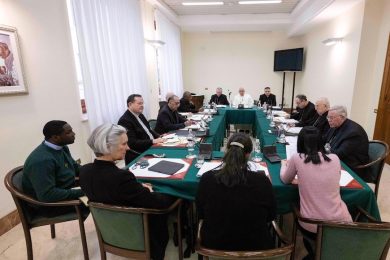By John Mulderig | Catholic News Service
NEW YORK (CNS) — As an addition to the Marvel Comics cinematic universe, the origin story “Black Widow” (Disney) provides the expected elements of large-scale special effects and intrepid derring-do.
Screenwriter Eric Pearson’s script, moreover, weds these ingredients to a number of morally respectable themes.
In the end, however, the former aspects of the movie overshadow the latter, weakening the ethical impact of director Cate Shortland’s action adventure.

As opening scenes set in 1995 show us, young Natasha Romanoff (Ever Anderson), from whose adult alter ego (Scarlett Johansson) the film takes its title, was raised, for a time, by sleeper agents working against the United States. Along with ostensible mom Melina Vostokoff (Rachel Weisz) and supposed dad Alexei Shostakov (David Harbour), Natasha had a fake younger sister, Yelena Belova (Violet McGraw).
Once their undercover mission ended, the two girls were forcibly inducted into a program called the Red Room. Run by villainous Gen. Dreykov (Ray Winstone), this ruthless training regime deprived its subjects of free will and compelled them to do Dreykov’s bidding.
Thus, by the time we arrive in the present, not only is Black Widow Natasha’s personal moniker, it’s also a collective term for all Red Room alumnae, a group to which both Melina and the now-grown Yelena (Florence Pugh) belong. As for Alexei, he has an alternate persona in the form of Red Guardian, the Soviet Union’s rather inadequate answer to Captain America.
With the Avengers ensemble of superheroes Natasha joined after undergoing a conversion temporarily in disarray, she and Yelena try to overcome their fraught past and collaborate in the battle to thwart Dreykov’s ongoing scheme for world domination. Alexei and Melina, with whom they are eventually reunited, may or may not turn out to be their allies in this struggle.
Amid the gunplay and the unfolding of the complex backstory, Pearson explores the proper limits on the use of force and touches as well on such topics as clan solidarity, compassion toward adversaries and contrition for past misdeeds. All of these are treated in a way congruent with Gospel values, yet the film, while visually rich, ultimately fails to deliver an emotional wallop.
As a result, moviegoers and streamers will probably be satisfied with Natasha’s globetrotting quest as pure spectacle. It’s more doubtful that they’ll feel any deep connection to her character or that the lessons underlying her life story will linger with them.
The film contains frequent stylized but sometimes harsh violence, a few mild oaths and about a half-dozen uses each of crude and crass language. The Catholic News Service classification is A-III — adults. The Motion Picture Association rating is PG-13 — parents strongly cautioned. Some material may be inappropriate for children under 13.
Mulderig is on the staff of Catholic News Service.






















